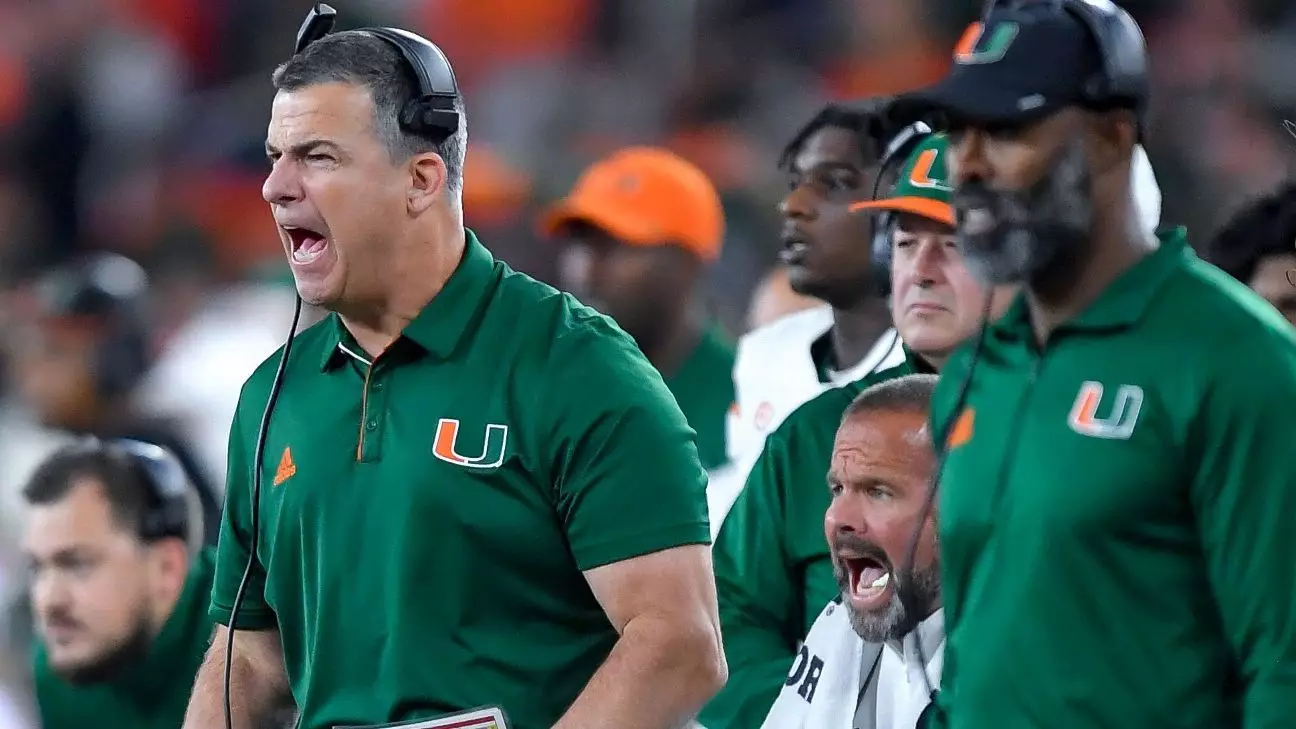The recent release of the College Football Playoff (CFP) rankings has sent shockwaves through college football, especially for the Miami Hurricanes. The announcement revealed that Miami had slipped to No. 12, while Alabama, despite facing losses this season under new head coach Kalen DeBoer, managed to secure the No. 11 position. This outcome raises pertinent questions about the criteria used for ranking teams and the overall fairness of the selection process. With the ACC Championship game upcoming and unlikely scenarios producing even more surprises, the Hurricanes now see themselves on the brink of exclusion from this year’s 12-team playoffs.
Miami was built on solid foundations this season, boasting a commendable 10-2 record. Coach Mario Cristobal has passionately articulated his team’s achievements, emphasizing their strong start and ability to notch victories, particularly their decisive win against Florida. With a potent offense led by Heisman candidate quarterback Cam Ward, they amassed impressive statistics, leading the nation in both yards and points scored per game. Yet, despite these accolades, the glaring spotlight remains fixed on the Hurricanes’ recent losses.
The factors leading to Miami’s drop in the rankings cannot be overlooked. The losses — particularly one to Syracuse, where they fell 42-38 — represented not merely defeat but disappointment, marking the Hurricanes’ second setback in three games, all of which occurred within the conference. Such outcomes automatically diminish a team’s standing, especially when compared to teams like Alabama, which continues to hold a storied legacy in college football. The narratives constructed around the powerhouses often overshadow deserving contenders who may not have the same level of historical prestige.
The fallout from the rankings reached the office of ACC Commissioner Jim Phillips, who expressed his astonishment and frustration regarding Miami’s circumstances. Phillips articulated the league’s collective sentiments: “incredibly shocked and disappointed” encapsulated the feeling that Miami deserved a higher placement for their efforts. He recognized the potential discrepancies within the selection committee’s methodology that led to this unfair assessment, suggesting that the rankings did not fully appreciate Miami’s capability and competitiveness.
The commissioner’s commentary underlined a sentiment prevalent in college sports: the often stark reality of bias towards traditional powerhouses. The possibility that Miami could be left out of postseason play entirely, despite statistical successes and impressive individual performances, raises essential questions about equity in college football’s elite structure. The persistent narrative of tried-and-true programs versus emerging competitors leads to heated debates regarding what truly constitutes deserving success.
Miami’s statistical prowess lends credence to Cristobal’s assertions about their deserving status in the playoffs. With the advantage of leading in offensive performance metrics, along with a respectable defensive showing despite some inconsistency, Miami’s case shines brightly in certain areas. Their unbeaten home record highlighted their strength in friendly conditions, yet the committee’s bias towards losses dealt the Hurricanes a severe blow.
Two brutal defeats, both within single possessions, are eerily overshadowed by the broader narrative surrounding team performance. Cristobal’s appeal for the committee to “go to the facts” is a call for a clearer, data-driven analysis rather than a reliance on outcomes that may not resonate with the full story of a team’s journey. Drawing comparisons with teams that squeak into playoffs while potentially holding less merit underscores the challenge of this selection process.
Looking ahead, the Miami Hurricanes must confront not only the disappointment of the current rankings but also the larger implications for their football program. They find themselves grappling with the need to reinforce their narratives and establish a more prominent identity within college football’s hierarchy. As the dust settles on this season, the dialogue surrounding fairness, merit, and hard work will likely continue dominating conversations across the nation.
While the focus has shifted momentarily from Miami to teams like Alabama, the Hurricanes must evolve and push harder in their quest for football excellence. Cristobal and the organization are at a pivotal juncture where redefining their strategies and fortifying their competitive edge will be essential in reestablishing themselves as a constant presence in postseason conversations. As the 12-team playoff looms, one can only hope the lessons learned from this ranking misstep will fuel even greater aspirations in the future.


Leave a Reply